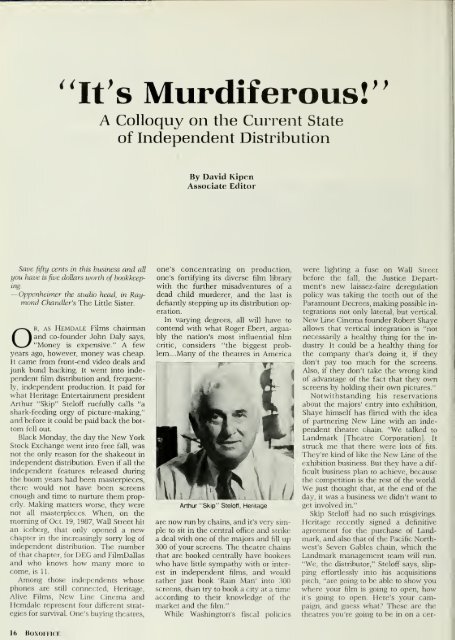Create successful ePaper yourself
Turn your PDF publications into a flip-book with our unique Google optimized e-Paper software.
It s Murdiferous!''<br />
A Colloquy on the Current State<br />
of Independent Distribution<br />
By David Kipen<br />
Associate Editor<br />
Save fifty cents in this business and all<br />
you have is five dollars worth of bookkeeping<br />
—Oppenheimer the studio head, in Raymond<br />
Chandler's The Little Sister.<br />
OR,<br />
AS Hemdale Films chairman<br />
and co-founder John Daly says,<br />
"Money is expensive." A few<br />
years ago, however, money was cheap.<br />
It came from front-end video deals and<br />
junk bond backing. It went into independent<br />
film distribution and, frequently,<br />
independent production. It paid for<br />
what Heritage Entertainment president<br />
Arthur "Skip" Steloff ruefully calls "a<br />
shark-feeding orgy of picture-making,"<br />
and before it could be paid back the bottom<br />
fell out.<br />
Black Monday, the day the New York<br />
Stock Exchange went into free fall, was<br />
not the only reason for the shakeout in<br />
independent distribution. Even if all the<br />
independent features released during<br />
the boom years had been masterpieces,<br />
there would not have been screens<br />
enough and time to nurture them properly.<br />
Making matters worse, they were<br />
not all masterpieces. When, on the<br />
morning of Oct. 19, 1987, Wall Street hit<br />
an iceberg, that only opened a new<br />
chapter in the increasingly sorry log of<br />
independent distribution. The number<br />
of that chapter, for DEG and FilmDallas<br />
and who knows how many more to<br />
come, is 11.<br />
Among those independents whose<br />
phones are still connected. Heritage,<br />
Alive Films, New Line Cinema and<br />
Hemdale represent four different strategies<br />
for survival. One's buying theatres.<br />
one's concentrating on production,<br />
one's fortifying its diverse film library<br />
with the further misadventures of a<br />
dead child murderer, and the last is<br />
defiantly stepping up its distribution operation.<br />
In vaiying degrees, all will have to<br />
contend with what Roger Ebert, arguably<br />
the nation's most influential film<br />
critic, considers "the biggest problem.<br />
...Manv of the theatres in America<br />
Arthur "Skip" Steloff, Heritage<br />
are now run by chains, and it's veiy simple<br />
to sit in the central office and strike<br />
a deal with one of the majors and fill up<br />
300 of your screens. The theatre chains<br />
that are booked centrally have bookers<br />
who have little sympathy with or interest<br />
in independent films, and would<br />
rather just book 'Rain Man' into .300<br />
screens, than trj' to book a city at a time<br />
according to their knowledge of thimarket<br />
and the film."<br />
While Washington's fiscal policies<br />
were lighting a fuse on Wall Street<br />
before the fall, the Justice Department's<br />
new laissez-faire deregtilation<br />
policy was taking the teeth out of the<br />
Paramount Decrees, making possible integrations<br />
not only lateral, but vertical.<br />
New Line Cinema founder Robert Shave<br />
allows that vertical integration is "not<br />
necessarily a healthy thing for<br />
the industiy.<br />
It could be a healthy thing for<br />
the company that's doing it, if they<br />
don't pay too much for the screens.<br />
Also, if they don't take the wrong kind<br />
of advantage of the fact that they own<br />
screens by holding their own pictures."<br />
Notwithstanding his reservations<br />
about the majors' entry into exhibition,<br />
Shaye himself has flirted with the idea<br />
of partnering New Line with an independent<br />
theatre chain. "We talked to<br />
Landmark [Theatre Corporation]. It<br />
struck me that there were lots of fits.<br />
They're kind of like the New Line of the<br />
exhibition business. But they have a difficult<br />
business plan to achieve, because<br />
the competition is the rest of the world.<br />
We just thought that, at the end of the<br />
day, it was a business we didn't want to<br />
get involved in."<br />
Skip Steloff had no such misgivings.<br />
Heritage recently signed a definitive<br />
agreement for the purchase of Landmark,<br />
and also that of the Pacific Northwest's<br />
Seven Gables chain, which the<br />
Landmark management teatn will nm.<br />
"We, the distributor," SteloflP says, slipping<br />
effortlessly into his acquisitions<br />
pitch, "are going to be able to show you<br />
where your film is going to open, how<br />
it's going to open. Here's your campaign,<br />
and gtiess what? These are the<br />
theatres you're going to be in on a cer-<br />
16 BOXOFFICE

















